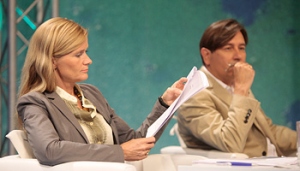 Karl-Gustav Ruch (Bild: ORF/Johannes Puch)
Karl-Gustav Ruch (Bild: ORF/Johannes Puch)
Cacophony of voices and chamber opera
Karl Gustav Ruch from Switzerland followed a strange sound “Hinter der Wand” (Behind the wall) in his literature. The third author to read this morning and invited by juror Paul Jandl, he left the jury with conflicting impressions.
“Da ist ein leises Kratzen” (There is a quiet scraping sound), notices the nameless first-person narrator in Ruch’s text one day – and decides to be on the lookout. Is it coming from the writer in the attic? Or is it perhaps the kidnap victim the papers are talking about, locked in behind the firewall?
Sulzer: “not convinced, but amused”
Alain Claude Sulzer praised the “text setting”, where an “evidently non-Spanish narrator” lives in a “Spanish apartment building”, but says: “I have read about this sound behind the wall before.” Initially, the Spanish lifestyle is “recounted in an amusing way”, but at one point, he thinks, it loses its sense of possibility (“where does the sound come from?”).
The text, Sulzer believes, should be shortened a little – an opinion that other jurors should share. “I am not entirely convinced but I was amused.”
 Meike Feßmann, Alain Claude Sulzer (Bild: ORF/Johannes Puch)
Meike Feßmann, Alain Claude Sulzer (Bild: ORF/Johannes Puch)
Too much “narcissism” according to Burkhard Spinnen
Burkhard Spinnen drew a comparison with television: “Threatening everyday reality – two out of every three TV crime shows do the same thing.” The threat to your life posed by “new” sounds is that they, unlike those that are well-known and evoke proximity and familiarity, do not have an associated “story”. Here, this “gap” tilts over into fear of strangers. Spinnen, however, finds the text too “narcissistic”, and believes it would have been better shorter.
 Karl-Gustav Ruch (Bild: ORF/Johannes Puch)
Karl-Gustav Ruch (Bild: ORF/Johannes Puch)
Keller heard a “cacophony of voices”
Heike Feßmann praised the idea of the sound in the wall – its implementation however is too schematic for her. She nonetheless liked reading the text.
Hildegard Elisabeth Keller thought that several different narrative traditions can be detected in the text, such as Josef Roth’s “Hotel Savoy”, where society is portrayed as “Overall Hotel World”. “A cacophony of voices, a symphony” is what she believes this musical text is – but, Keller, too, would have “shortened it a little” here and there.
Harsh criticism from Ijoma Mangold
Ijoma Mangold came out as the most severe critic – he denied that the text has any “literary significance”: “It’s a literary museum of knickknacks.” Generally, the voyeuristic perspective is very fruitful for literature – here, however, the pluralism of society is just a clichéd symbol, portrayed using “transfer pictures”.
 Ijoma Mangold (Bild: ORF/Johannes Puch)
Ijoma Mangold (Bild: ORF/Johannes Puch)
A “musical chamber opera”
Paul Jandl asked whether Mangold had overstepped the pain threshold of criticism: “Irony works with clichés after all. This musical chamber opera feeds on the sound of words!”
Role prose, similar to Plato’s Cave, where the sounds act as shadows of the world. “A text of solitude”, that could not at all be called “cute” or “lovely”: “The hurdle is not high, but the jump across is higher than necessary”, says Jandl. And, in Mangold’s direction: “Don’t be so hard-nosed!”
Barbara Johanna Frank
translated by expectTranslations